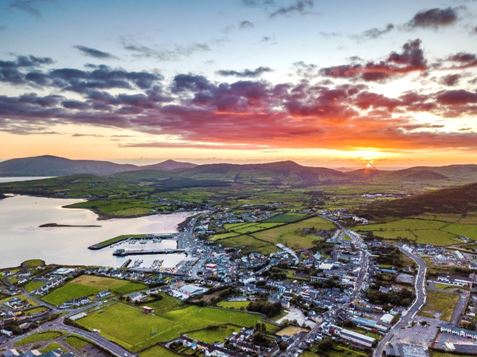As decarbonization accelerates in many parts of the world, local energy communities and consumers are assisting in the energy transition. In the Dingle Peninsula, Dublin-based non-profit energy R&D institute EPRI Europe and four other Irish institutions are leading a pilot that is testing tools to assist in the reliability, flexibility, and security of the local energy system.
In addition to EPRI Europe, the pilot involves four organisations: the DINGLE Hub, MaREI, energy solutions company DCSix Technologies, and Irish energy utility ESB Innovation. This pilot will test innovative techniques that use information and analysis to help the local community produce and manage its own energy more efficiently and reliably, enabling them to become energy self-sufficient.
“This pilot is one of six taking place across different European countries, as part of the ENPOWER project. As an institution working for the public benefit, EPRI Europe is providing technical support to use cases on local grid flexibility and resilience. By analyzing data from smart meters, electric vehicles, solar panels, heat pumps and other technologies, we are generating detailed energy consumption and production profiles. These insights could help the peninsula optimize energy usage, leading to greater sustainability,” said Mário Couto, technical leader at EPRI Europe.
Leading the pilot, Deirdre de Bhailís, general manager at DINGLE HUB, said, “We are engaging, sharing information, and co-creating knowledge to activate various types of citizens at scale to become prosumers (electricity producers), adopt new technologies, and engage in local energy communities. For instance, we are working with individuals and energy groups to adopt digital tools that support adjusting electricity usage in response to price signals or grid conditions to optimize the operation of the power grid. In agriculture and tourism, both extremely important sectors on Dingle Peninsula, we are supporting farmers and local businesses to install solar panels and heat exchangers, thus becoming more sustainable. In transport, new electric buses will contribute to reducing private transportation and making travel cleaner.”
Professor Brian Ó Gallachóir, director of MaREI, said, “We are at a critical stage in the promotion of community-led energy solutions. We need more inclusive and democratic input to ensure the development of new digital and energy technologies aligns with local needs and concerns. In our research, we hope to leverage democratic innovations focused on deliberative engagement and future-oriented approaches to give voice and co-develop solutions with pilot representatives in Dingle.”
The introduction of new digital tools and energy solutions in tourism, agricultural, and transport sectors could make the peninsula more sustainable and self-sufficient, assisting and accelerating the overall clean energy transition.
The ENPOWER (Energy Activated Citizens and Data-Driven Energy-Secure Communities for a Consumer-Centric Energy System) aims to design, develop, and demonstrate Social Sciences Humanitarian driven methodologies, interactive and closed-loop tools and services for energy-activated citizens and data-driven energy-secure communities towards a consumer-centric energy system. The project comprises 28 partners from 13 different countries. It is funded by the European Union’s Horizon Europe program, under agreement no. 101096354.
About EPRI Europe
Ireland-based EPRI Europe DAC was established in 2019 by EPRI International Inc. as its European research arm. Founded in 1972, EPRI is the world’s preeminent independent, non-profit energy research and development organization, with offices around the world. Our trusted experts collaborate with more than 450 companies in 45 countries, driving innovation to ensure the public has clean, safe, reliable, affordable, and equitable access to electricity across the globe. Together, we are shaping the future of energy.

